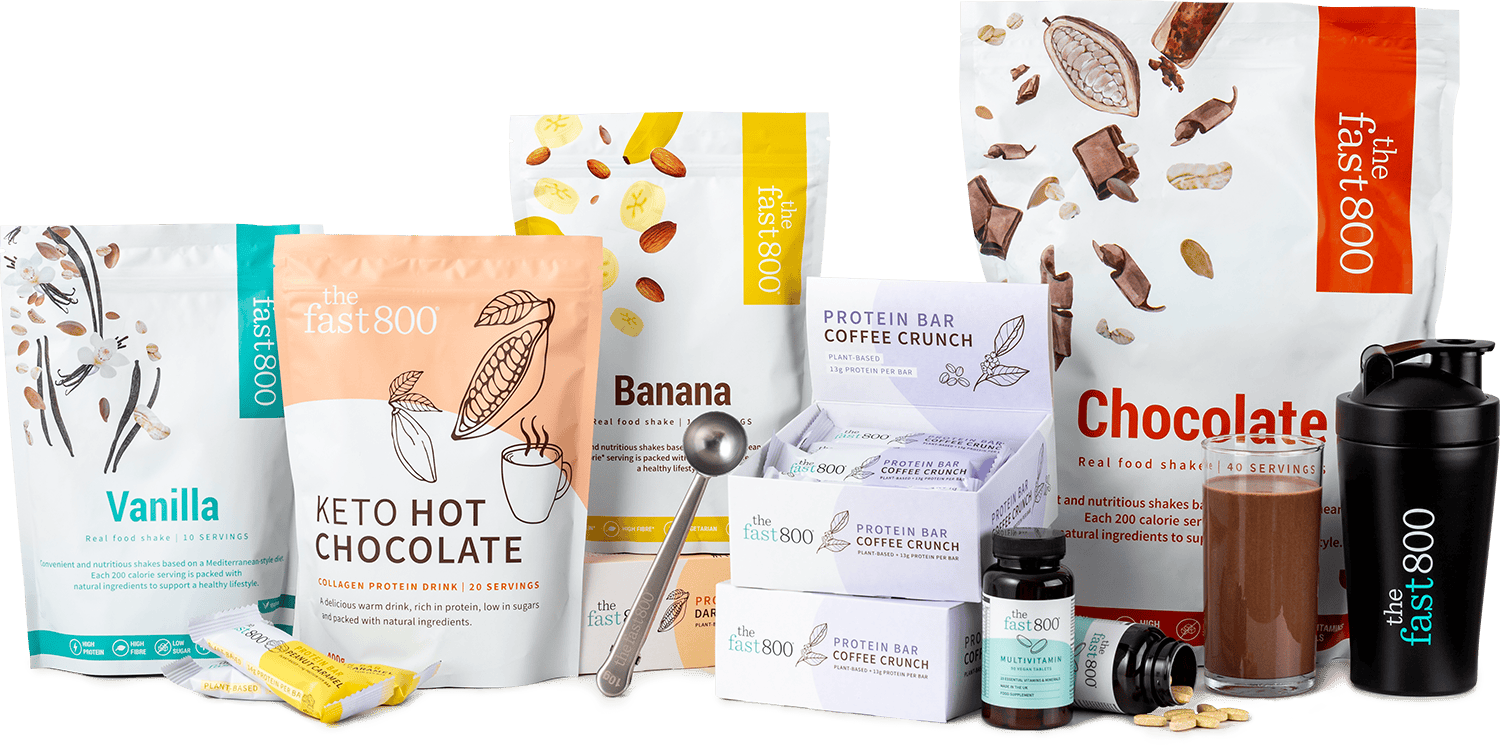Ultra-processed Food? Opt for Mediterranean instead
The 21st century diet is the driving force behind our obesity pandemic. With convenience food manufacturers bringing in hefty profits from clever marketing techniques, it’s now thought that 65% of the average calories of someone in the UK is made up of ultra-processed foods.1
Eating well and achieving a healthy weight is about far more than how you look. It’s about improving your mental wellbeing, protecting your brain and avoiding the development of chronic diseases, such as type 2 diabetes and cardiovascular disease. Our answer is a Mediterranean-style diet, proven by science to be one of the healthiest in the world, while being satisfying and delicious.
A notable study
A 2019 randomised controlled trial took 20 healthy adults and split them into two groups; the first group followed a diet of ultra processed foods for two weeks, followed by two weeks of unprocessed foods and the second group did the opposite.2 The meals provided to both groups were matched in terms of calories, energy density, macronutrients, sugar, sodium, and fibre and each volunteer was advised to eat as much, or as little, as they wanted. Interestingly, calorie intake was significantly higher (upto 500 calories) on days when the participants were given ultra processed foods and on average, the subjects gained upto 0.9kg on an ultra-processed diet and lost upto 0.9kg eating an unprocessed diet, over the course of the two weeks. The conclusion from this study was that limiting the intake of ultra processed foods may help to prevent, and treat, obesity.
Start our easy, science-backed programme today with a 7-day free trial
Enjoy over 850 recipes, guided workouts and a supportive community of members and Health Coaches.
START YOUR FREE TRIAL
The importance of a Mediterranean-style diet
The availability, and low price, of modern day industrially processed foods is most commonly the reason so many suffer with type 2 diabetes, joint problems, sleep apnoea and so much more. Not only this, visceral fat puts heavy strain on organs and if it’s not combated, can lead to very dangerous consequences. A Mediterranean-style diet can change this without feeling like a diet you commonly want to break away from. Scientific studies have found that this diet has the potential to:
- Help you lose weight and lower levels of LDL cholesterol;3
- Reverse, or reduce your risk of, type 2 diabetes;4
- Reduce the risk of Alzheimer’s;5 and,
- Prevent heart disease and stroke.6
Notably, sitting down to enjoy food, eating slowly and away from any distractions is also important as it allows you to recognise when you’re full. Processed foods high in salt and sugar go down very quickly and it’s theorised that, as a result, this gives us less awareness of when we’re full. Have you ever noticed that fullness comes on very quickly when digging into a takeaway? Mindful eating may be the answer and you might find that you’ll enjoy the experience of eating food more. The Fast 800 Online Programme has a mindfulness library, along with 12 week’s of educational content with useful advice on mindful eating, emotional eating and how to know whether you’re genuinely hungry or not.
Although we encourage people to take time and eat mindfully, we do understand that life does get in the way and it’s often easier to reach for convenience foods that don’t take too much time away from your busy day. Although we can’t change your schedule, we may be able to help you with convenience options that won’t stray you away from a healthy diet.
Convenience foods that won’t put your health on the line
There are days when preparing healthy, fresh food isn’t an option and finding an alternative that will keep you away from ulta-processed grab and go foods is important to ensure you avoid falling off the wagon. The Fast 800 shakes are a bespoke product, fully embraced, and developed, by Dr Michael Mosley and Dr Clare Bailey. Importantly, they reflect our philosophies of following a lower carb, Mediterranean-style diet.
Before we created The Fast 800 shakes, we extensively researched other shakes on the market to advise our members which ones would be best as they were eager to have an option for busy days. Other shakes often sweeten with sucralose, an artificial sweetener, or maltodextrin which, despite coming from plants, is highly processed, is high on the glycemic index and, as a result, can spike blood sugars and leave your hungry very shortly after.7 In addition, we found that other shakes contain thickeners and additives to extend their shelf life.
The Fast 800 shakes are different.
You’ll see from our list of ingredients that they contain only natural ingredients with a vitamin and mineral mix and probiotic blend to help improve gut health. We sweeten our shakes with Stevia, a plant that is a member of the chrysanthemum family. In a 2010 study8 testing the influence of Stevia on 19 healthy lean and 12 obese adults found that Stevia significantly lowers glucose and insulin levels in comparison to aspartame – a popular sweetener found in “diet” drinks, sugar-free gum and some meal replacement shakes – and sucrose, more commonly known as sugar. Other shakes may spike blood sugars and induce cravings whereas we were very firm when creating The Fast 800 shakes that this simply wasn’t an option.
We’ve custom made the shakes, and handpicked each ingredient, with the intention that the shakes may help to lower blood sugars, increase daily nutrient intake and reduce the risk of chronic conditions, while being low enough in calories to help our customers lose weight for better health.
Emulsifiers
Emulsifiers are commonly found in processed foods to improve texture. While some can be harmful to your gut bacteria and lead to inflammation in the gut, there are some exceptions. Our general advice is that if a product does not specify exactly which emulsifier is used in the ingredients list, we recommend staying clear.
The Fast 800 protein bars contain lecithin, a naturally occurring emulsifier, which has been recognised in studies to benefit humans by lowering cholesterol and improving digestion.9 In a solid bar, an emulsifier is used to improve the texture and to help bind fats and water together to prevent them from separating while the bar is waiting to be consumed. When we were developing our bars, we did a lot of research to find an emulsifier that wouldn’t harm your gut health and lecithin was one of the few that didn’t.
Our range of products has been created to support people who are looking to lose weight and improve their health but don’t always have the time to cook high-protein, Mediterranean-style meals.
Here are some of our most popular shakes recipes:
While whole foods are always recommended first, we feel confident that our shakes reflect a Mediterraean-style diet, high in fibre, healthy fats and protein, made up of only natural ingredients. Swapping ultra-processed convenience foods for a meal replacement shake, like ours, on days when you’re on the go and short for time will put you in a better position to achieve, and maintain, a healthy lifestyle.
Khandpur N, Neri D, A, Monteiro C, Mazur A, Frelut M, -L, Boyland E, Weghuber D, Thivel D: Ultra-Processed Food Consumption among the Paediatric Population: An Overview and Call to Action from the European Childhood Obesity Group. Ann Nutr Metab 2020;76:109-113. doi: 10.1159/000507840.
Hall KD et al. Ultra-Processed Diets Cause Excess Calorie Intake and Weight Gain: An Inpatient Randomized Controlled Trial of Ad Libitum Food Intake. Cell Metab. 2019 Jul 2;30(1):67-77.e3. doi: 10.1016/j.cmet.2019.05.008. Epub 2019 May 16. Erratum in: Cell Metab. 2019 Jul 2;30(1):226. Erratum in: Cell Metab. 2020 Oct 6;32(4):690. PMID: 31105044; PMCID: PMC7946062.
Meslier V, Laiola M, Roager HM, et alMediterranean diet intervention in overweight and obese subjects lowers plasma cholesterol and causes changes in the gut microbiome and metabolome independently of energy intakeGut 2020;69:1258-1268.
Estruch, R., Ros, E., Salas-Salvadó, J., et al. (2013) Primary Prevention of Cardiovascular Disease with a Mediterranean Diet Supplemented with Extra-Virgin Olive Oil or Nuts. N Eng J Med, 378, e34.
Tommaso Ballarini et al. Mediterranean Diet, Alzheimer Disease Biomarkers and Brain Atrophy in Old Age. Neurology, 2021 DOI: 10.1212/WNL.0000000000012067.
rosso et al.. 2015. “A Comprehensive Meta-Analysis on Evidence of Mediterranean Diet and Cardiovascular Disease: Are Individual Components Equal?” Critical Reviews in Food Science and Nutrition (November 3): 00–00.
Campbell GJ, Belobrajdic DP, Bell-Anderson KS. Determining the Glycaemic Index of Standard and High-Sugar Rodent Diets in C57BL/6 Mice. Nutrients. 2018;10(7):856. Published 2018 Jul 1. doi:10.3390/nu10070856.
Anton SD, Martin CK, Han H, et al. Effects of stevia, aspartame, and sucrose on food intake, satiety, and postprandial glucose and insulin levels. Appetite. 2010;55(1):37-43. doi:10.1016/j.appet.2010.03.009.
https://www.sciencedirect.com/science/article/pii/S1756464623001408#:~:text=A%20recent%20study%20using%20in,et%20al.%2C%202021).











